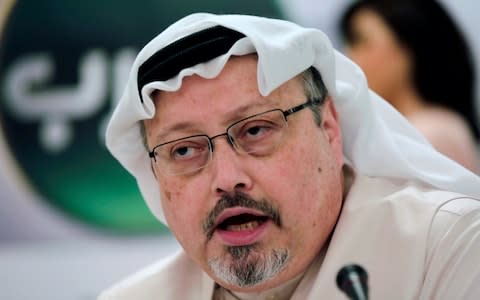Saudi Arabia to 'admit killing Jamal Khashoggi in botched interrogation'
Saudi Arabia is to admit journalist Jamal Khashoggi was killed in its consulate in Istanbul in a botched interrogation, according to reports on Monday night.
Officials from the kingdom were expected to lay out a series of events which blamed intelligence operatives, and shielded Mohammed bin Salman, the crown prince, from responsibility over the journalist's death.
It came as Donald Trump, after speaking to Saudi Arabia's King Salman, suggested "rogue killers" could have been behind the death of Mr Khashoggi, who was a US permanent resident and wrote columns for the Washington Post.
The US president also dispatched Mike Pompeo, his secretary of state, to fly directly to Riyadh to meet the king and seek answers about the alleged murder.
Saudi Arabia was said to be preparing a report that would confirm Mr Khashoggi was killed as a result of questioning that went wrong, CNN reported, citing two unnamed sources.

One source cautioned that the report was still being prepared and could change.
The other source said the report would probably conclude that the operation was carried out without clearance, and that those involved will be held responsible.
Another person with knowledge of how Saudi Arabia intends to explain the episode told the New York Times the crown prince had approved an interrogation, or rendition back to Saudi Arabia, of Mr Khashoggi.
But the kingdom intended to say that a member of its intelligence services, who happened to be a friend of the crown prince, had been "tragically incompetent" in trying to prove himself during the operation, the newspaper reported.
Following his first phone call with King Salman about the crisis, Mr Trump said the monarch had “firmly denied” his state was behind the killing of Mr Khashoggi.
Just spoke to the King of Saudi Arabia who denies any knowledge of whatever may have happened “to our Saudi Arabian citizen.” He said that they are working closely with Turkey to find answer. I am immediately sending our Secretary of State to meet with King!
— Donald J. Trump (@realDonaldTrump) October 15, 2018
Speaking on the White House lawn, Mr Trump said: "I don’t want to get into his mind, but it sounded to me like maybe it could have been rogue killers, who knows? We’re going to try get to the bottom of it very soon, but his was a flat denial."
Turkish officials had already speculated that the Saudi government would blame "rogue" elements within its security services as a way of protecting the crown prince, who has close links with the Trump family, from international criticism.
King Salman had ordered Saudi prosecutors to launch an internal probe after two weeks in which Riyadh did little except issue blanket denials of responsibility.
The apparent shift in the Saudi position came as the kingdom remained under intense pressure from Washington and business leaders over the Khashoggi case.
The White House said it expected Saudi Arabia to carry out "a swift and transparent” investigation "this week”.
Larry Kudlow, Mr Trump’s economic advisor, said the US would take “stern action with the Saudis if necessary” and brushed off Riyadh’s threats to drive up oil prices if America tried to impose sanctions.
The chiefs of two major US investment firms, Blackstone and BlackRock, joined an exodus of executives pulling out of Crown Prince Mohammed’s “Davos in the Desert” summit.
A number of major media outlets have also pulled out of the summit.
Analysts said it was risky for Riyadh to blame rogue Saudi operatives because it would raise questions about whether Crown Prince Mohammed, who is Saudi Arabia’s defence minister, was in charge of his own forces.
Dr Neil Quilliam, senior research fellow at Chatham House, said it was “highly unlikely” that US senators would be convinced by the rogue killer theory, but it was still Riyadh’s best chance to avoid sanctions.
